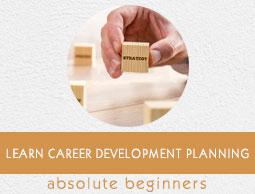Career Development Planning - Stages
In this chapter, we will discuss regarding the elements which are involved in the career development and the planning process.
In general, career building involves two acts −
Building one’s own career through available career opportunities and
Realizing the career goals that the organization expects that the employee will perform and vindicate the trust that the recruiters showed in him during his selection.
Career planning can also be defined as the process in which an employee can use the available opportunities within the organization to further their own personal benefits. But at the same time, it should be well within the limits of organizational compliance. In that sense, career planning should ideally start before joining the company.

Five Stages of Career Development Planning
Career planning involves five important stages. They are −
- Assessing self and identifying areas of strength and aptitude.
- Finding career opportunities that suit your strengths.
- Setting goals in personal and professional life.
- Planning the actions of how to attain goals.
- Periodic evaluation of performance.
Let us now discuss the above-mentioned stages in detail.
Assessing Self
Assessing oneself is the act of reviewing one’s priorities, personal interests, strengths and weaknesses, along with appropriate skill sets. These reviews help the employee to get a realistic idea of his chances at career growth in the organization. Assessing will also give him a transparent picture of the skill sets required for specific job descriptions and promotions.
While this is a great tool for exploring growth opportunities in one’s own organization, job seekers can use it to look for opportunities among friends and family, and in job fairs. This reality checking also helps in finalizing goals and setting aims for the future.
Finding Career Opportunities

After the self-assessment is done, the next step is to get a reality check on what skills the person has and how they can serve him. In this step, the candidate is supposed outline all the steps that he needs to follow to reach a specific career. This involves taking stock of technical knowledge and whether it is sufficient to guarantee a job opportunity.
The next significant objective is networking. The candidate should search, if he has anyone in his contact who can offer an opportunity to him, or facilitate the same. A working professional can utilize this step in making a realistic assessment of his goals, if they are still achievable, and all the changes that happened in the work place to influence his outlook.
Most of the organizations conduct annual appraisals that have many such self-assessment questionnaires. This is where candidates can give themselves a fair score and prove to the management, where all they have contributed in the growth of the organization.
Setting Goals in Personal and Professional Life

In this phase, the candidate checks a range of career opportunities available to him and determines which of his skillsets and knowledge levels will be needed in the job of his choice. In this step, the candidate does research and information-gathering from multiple sources like friends, colleagues, co-workers, etc. and tries to find the best way that works for him.
In this stage, many potential job-seekers also post their profiles in job placement centers, who in turn, provide them with a list of qualifications that employers seek in a candidate’s profile. A similar situation is found inside the organization as well, where possible options for a position are asked to brush up their skills.
Goal Setting
The third step in the process of career planning is that of goal setting, where a person undergoes a period of self-assessment and investigates his career opportunities to decide his long-term prospects in an organization. It is important for the candidate to keep checking all his options for a viable future.
It is also imperative that he looks for opportunities tailored for his personal interests, abilities and skills. In short, his goals should be specific, measured, set and reachable, so that he can gauge his success in pursuing it.
Action Planning

Action planning involves the steps required to achieve goals such as additional training or getting a specific set of managerial skills either for his current position or for the one that he is aspiring to get. This step usually involves a lot of communication with the senior employees working in different roles in the organization. As these seniors are the individuals who can share information with the rest of the people and inform them about the various dynamics in the working spheres.
Periodic Evaluation of Performance
The final step is evaluation of the progress made in inching towards the career goals. Evaluating one’s success helps people keep a track of their progress and identify strengths and weaknesses in a career plan.
This habit of self-assessment helps people keep their priorities in check and keep evolving their skills as a continuous process, not an isolated, one-time effort. Also, self-assessment helps in getting knowledge on different functionalities in the working sphere.






